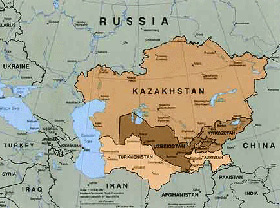
Uzbekistan requests South Korea to revive Aral Sea
Salikhbayev said he plans to formally raise the issue at South Korea’s annual forum with Uzbekistan, Kazakhstan, Kyrgyzstan, Turkmenistan, and Tajikistan to be held in Seoul in December, reported South Korea’s Yonhap news agency on Tuesday.
The Aral Sea, located between Uzbekistan and Kazakhstan, is a symbol of man-made environmental and ecological disaster. It was about two thirds the size of South Korea until the early 1960s, but its water volume has decreased by 75 percent and the shoreline has receded up to 160km from its former shore, according to experts.
The cause was traced to the Soviet-era policy to divert two rivers which fed the Aral Sea to grow cotton in nearby areas.
With the wreckage of rusty vessels embedded in the sand where water once stood, the Aral Sea is nicknamed a "ship graveyard," and a growing number of residents in a town adjacent to it suffer from cancer, respiratory problems and other diseases as the now-dusty sea basin is heavily polluted, leading to poisonous air and drinking water.
"Uzbekistan and South Korea can step up cooperation in the medical and green growth sectors," Salikhbayev said in an interview with a group of South Korean reporters last week at his ministry.
"We hope South Korea will participate in the Aral Sea salvation project, especially in tap water purification and medical services for victims."
He said the five Central Asian nations have formed the International Foundation for the Salvation of the Aral Sea and held a summit among their leaders in April to discuss ways to resurrect the lake.
"German and Japanese firms have already joined the project, and we are prepared to work together with South Korea if it has the intention to do so," Salikhbayev said.
He also expected the two nations to boost economic cooperation as agreed between Uzbek President Islam Karimov and his South Korean counterpart Lee Myung-bak during their summit here in May.
South Korea is a main investor in the ongoing project to create Uzbekistan’s first free industrial economic zone in the central region of Navoi.
"The Navoi Free Industrial-Economic Zone project has provided a chance for the two sides to become important partners," he said.
"If this business succeeds, it will have a positive impact not only on Uzbekistan but also on other Central Asian nations."
Salikhbayev said his government will pay more attention to some 150,000 ethnic Koreans, known as "Koryoin," living in the country.
"They are playing a role as a bridge between the two nations," he said.
The community is a legacy of the mass immigration of Koreans to the Soviet region during the declining years of Korea’s Joseon Dynasty (1392-1910) in the 19th century. Many moved to Siberia, which they believed was a prosperous land, but were forcefully moved to Central Asian states under Stalin’s rule in the late 1930s.